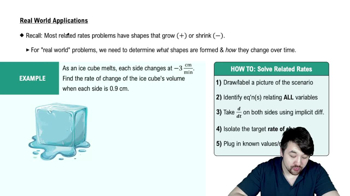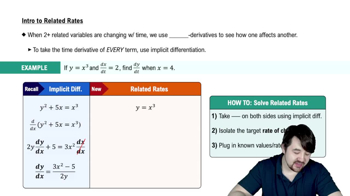Table of contents
- 0. Functions7h 52m
- Introduction to Functions16m
- Piecewise Functions10m
- Properties of Functions9m
- Common Functions1h 8m
- Transformations5m
- Combining Functions27m
- Exponent rules32m
- Exponential Functions28m
- Logarithmic Functions24m
- Properties of Logarithms34m
- Exponential & Logarithmic Equations35m
- Introduction to Trigonometric Functions38m
- Graphs of Trigonometric Functions44m
- Trigonometric Identities47m
- Inverse Trigonometric Functions48m
- 1. Limits and Continuity2h 2m
- 2. Intro to Derivatives1h 33m
- 3. Techniques of Differentiation3h 18m
- 4. Applications of Derivatives2h 38m
- 5. Graphical Applications of Derivatives6h 2m
- 6. Derivatives of Inverse, Exponential, & Logarithmic Functions2h 37m
- 7. Antiderivatives & Indefinite Integrals1h 26m
- 8. Definite Integrals3h 25m
4. Applications of Derivatives
Related Rates
Problem 12b
Textbook Question
The sides of a square decrease in length at a rate of 1 m/s.
b. At what rate are the lengths of the diagonals of the square changing?
 Verified step by step guidance
Verified step by step guidance1
Let the length of a side of the square be denoted as 's'. Since the sides are decreasing at a rate of 1 m/s, we can express this as ds/dt = -1 m/s.
The formula for the length of the diagonal 'd' of a square in terms of the side length 's' is given by d = s√2.
To find the rate at which the diagonal is changing, we need to differentiate the diagonal length with respect to time. Use the chain rule: dd/dt = (dd/ds) * (ds/dt).
Calculate dd/ds by differentiating d = s√2 with respect to s, which gives dd/ds = √2.
Substitute the values into the equation: dd/dt = (√2) * (ds/dt) and use ds/dt = -1 m/s to find the rate at which the diagonal is changing.
Recommended similar problem, with video answer:
 Verified Solution
Verified SolutionThis video solution was recommended by our tutors as helpful for the problem above
Video duration:
2mPlay a video:
Was this helpful?
Related Videos
Related Practice






